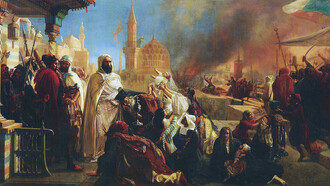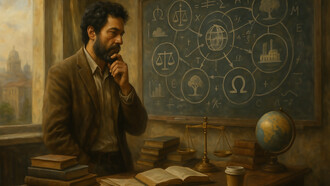Horrid Mysteries by Carl Grosse is one of the seven horrid novels of Northanger Abbey and owes its title to the grotesque nature of its subject matter. Yet despite the violence, murder, and the unexplained supernatural, it is significant for its portrayal of secret societies and the concern around the political role of women within society.
There were various groups and societies in the eighteenth century. Michael Taylor points to the Illuminati in Germany as being disillusioned with conservatism and Catholic institutions and having a plan for the subversion of church, state, and society. This involved a system of seduction, secrecy, and hierarchy designed to radicalise discontent with the established church and government. The Count tells the story of being a prisoner and being led through dark passages and into a vaulted cavern with two large chandeliers, which, when lit by candles in a damp environment, form a mist.
The walls are decorated with large mirrors backed by black cloth, and in front of this is a stage with seats where a chairman sits flanked by four women and five men, who are presumably the hierarchy of the organisation. It is interesting that Grosse includes women in this judicial assembly, although we do not hear them pronounce judgment. The Count is accused of being the lover of Francisca, and they are both sentenced to death, although the crime appears to relate to the divulgence of secrets, not adultery or fornication. The Count only pleads for himself, asserting his rank and calling down vengeance and destruction upon them.
He is then given the option to swear a solemn oath not to reveal what Francisca has told him for twelve months in exchange for his life. The irony being, at this point, Francisca has stated that she met the Count only an hour ago, and what secrets could she have revealed? As Taylor points out, the social and political roles of women were under scrutiny with the criticism of authors such as Mary Wollstonecraft, Mary Robinson, and Mary Hays. Such women were regarded as unfeminine. Therefore, a woman being a party to secret information, along with divulging the secrets of an organisation, is in keeping with the concerns of the time.
Grosse reinforces the idea of malevolence and mystery with Elmira’s note, written in blood and signed with three crosses. She speaks of unknown hands dispersed all over Spain, with no one knowing who they are, making their way through locked doors. Stories of girls being carried away against their will and then being found dead the morning after their marriage. Of a son quarrelling with a father, and his disappearance after his murder at the behest of these people. Elmira argues that these people depend on fear overcoming love, and her way of defying them is by secretly marrying the Marquis.
The ceremony was interrupted by the shrill call of a large bat, and at the third call, Elmira fainted. In the evening, the Marquis meets her in her apartment, but she grows pale, her eyes dim, and her lip distorted as she gnashes her teeth, inclining towards him. She dies in his arms, and no medical assistance can revive her. If Elmira sought to be an example of love overcoming fear, this gross supernatural transformation would suggest otherwise.
When the organisation tries to recruit the Marquis, one of the things he accuses them of is murdering Elmira, which they deny. They outline their purpose as “directing a groaning nation to happiness at a distance and in solitary seclusion from the pleasure of the world”. This suggests they are the power behind many decisions, and they claim their solitude inspires “heavenly sentiments” and “sublime plans”. Their influence also extends all over the globe, as they are independent and not exposed to the wants of life, caprice, or accidents. Independence also suggests a lack of accountability, and solitude does not foster transparency.
To become a member, there is a blood-letting ceremony where his wrist is pierced by a dagger and the blood collected in a goblet. Later, Rosalia will also cut his arm and drink his blood and vice versa as a sign of their heavenly union. The ritual, secrecy, and lack of transparency contribute to the mysticism and lack of accountability of these organisations.
In common with Matthew Lewis’s The Monk, there is an element of the fantastical and supernatural horror in this novel. The Marquis speaks of events that will “shock your feeling heart” and where he “lost everything dear” to him. In one incident, he opens his eyes believing he is witnessing the break of day, but the light grows so bright it is dazzling, and he sees “streams of sparkling fire dart through the apartment.” To accompany this, he also hears half-suppressed groans. When he tries to ring the bell to alert the servants, the string breaks, and he feels held down by an invisible power.
Grosse uses sight, sound, and touch to set the scene for the being that is to come, the genius, Amanuel. This ethereal white being can be compared to the genii of the Arabian Nights, but his name comes from the Hebrew Emanuel, or God with us, which appears ironic as he brings a warning to the Marquis not to elope with Elmira. The chamber door and windows are locked, which prevents any rational explanation regarding the spirit. The Marquis relays his experience to Elmira, and she insists they leave immediately. When they try to leave the room, the windows shatter inward, and a gust of wind extinguishes the candles, followed by a ball of fire illuminating the room.
The door opened and closed, signifying an invisible being walking through the apartment with a blast of ice-cold air along with burning hot steam. Elmira faints, and the Marquis needs to carry her from the room. As they both experience this supernatural occurrence, it cannot be dismissed by the reader as an individual dream or hallucination on the part of the character.
Horrid Mysteries, like Schiller and Lewis, belong to the Gothic horror of the eighteenth century. However, this book is significant due to the questions it raises about secret, clandestine societies and their influence on the nobility. It also portrays women in a more active and political role compared to the passive victims of the romantic Gothic. Due to its graphic nature, it probably deserves Austen’s label of horrid or scandalous, but like Lewis, it was probably a guilty pleasure.















